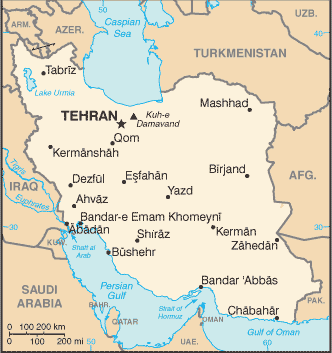March 23, 2012
Courtesy Of "Anti-War"
The United States, European allies, and Israel all agree that Iran does not have a nuclear weapon, has not decided to build one, and is several years away from having a deliverable nuclear missile. Still, aggressive postures towards Tehran continue.
 In 2007, the U.S. intelligence community concluded that Iran had halted weaponization of its nuclear program back in 2003 and has not restarted it since. That conclusion has been repeatedly reaffirmed in recent years, but some further details of the secret intelligence have been released.
In 2007, the U.S. intelligence community concluded that Iran had halted weaponization of its nuclear program back in 2003 and has not restarted it since. That conclusion has been repeatedly reaffirmed in recent years, but some further details of the secret intelligence have been released.
According to Reuters, U.S. intelligence intercepted telephone and email communications from late 2006 or early 2007 in which Mohsen Fakhrizadeh, a leading figure in Iran’s nuclear program, and other scientists complained that the weaponization program had been stopped. This was one piece of the puzzle that led to the 2007 finding.
According to reports, the U.S. has “significantly ramped-up American covert sabotage and non-proliferation campaign” inside Iran. Apparently “the CIA’s ops arm, the National Clandestine Service, along with the U.S. military” are “scrutinizing and seizing cargo shipments bound for Iran, tapping the black market for nuclear supplies and buying up spare parts, and maximizing the collection of Iranian signal traffic.” This has increased U.S. confidence in their assessments.
One primary type of intelligence the U.S. has on Iran’s nuclear program is what is called “measurement and signature intelligence,” or MASINT. These are “sensors on satellites, drones, and on the ground” measuring “everything from the electromagnetic signatures created by testing conventional missile systems to disturbances in the soil and geography around a hidden nuclear facility to streams of radioactive particles that are byproducts of the uranium enrichment process.” The U.S. “knows what Iran has and doesn’t have,” writes journalist Marc Ambinder.
These and other forms of intelligence have made current and former U.S. officials highly confident that Iran has no secret uranium-enrichment site outside the purview of U.N. nuclear inspections. While it was given hyperbolic treatment in the media, the IAEA’s November report helped confirm this in reporting that “the Agency continues to verify the non-diversion of [Iran's] declared nuclear material.”
Hawks, mainly in the U.S. and Israel, have argued for waging preventive war on Iran in a unilateral attack aimed at crippling Iran’s legal civilian nuclear program before it can make it immune from bombing by building facilities underground and making the program sufficiently redundant throughout the country.
But here again, U.S. intelligence has held that they would detect any move by Iran to restart weaponization activities. There is simply no evidence for a nuclear program and no sensible reason, or legal justification, to attack if a nuclear weapons program is the pretext.
There are perfectly viable alternatives to sanctions, aggression, and war. If Israel, for example, agreed to sign the Nuclear Non-Proliferation Treaty and open up its nuclear program to international inspections, as Iran has, the tension would probably dissipate. Further, if Israel agreed to give up its vast stockpiles of nuclear weapons and to imposing a nuclear weapons free zone in the Middle East - a deal Iran has repeatedly proposed - the tensions would surely vanish, along with the pretext for war. But this remains out of the question for Tel Aviv and Washington.




No comments:
Post a Comment